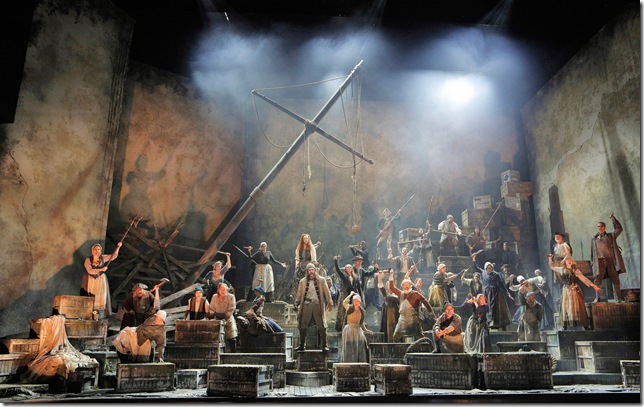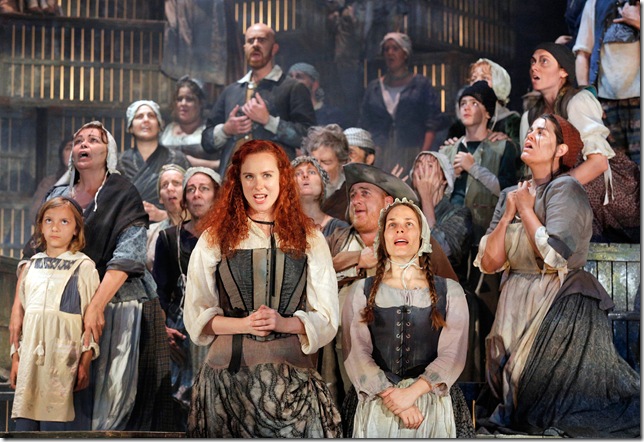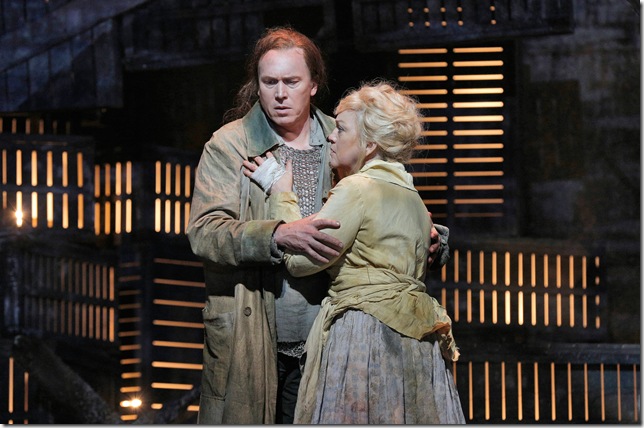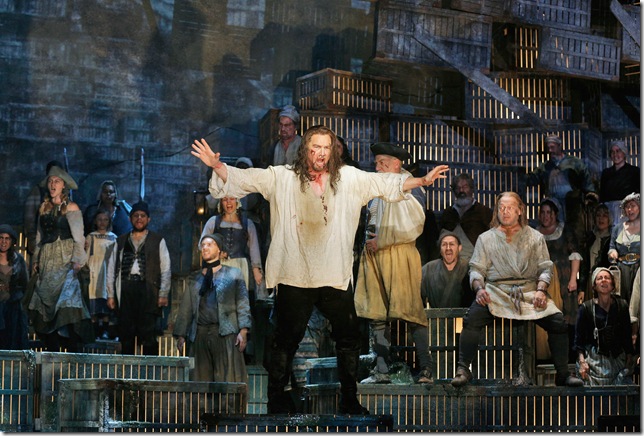The Bard (College) Summerscape Festival at Annandale-on-Hudson, N.Y., has gained fame for digging up old operas and breathing new life into them.
Dame Ethel Smyth’s 1906 opera, The Wreckers, ended its five-performance run in the magnificent Frank Gehry Theatre on Aug. 2, selling out to full houses. Leon Botstein, the artistic director and conductor of Summerscape, revived Weber’s Euryanthe last year, whose plot ruined the performance for me. 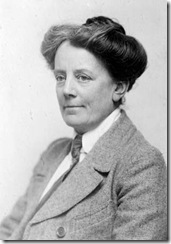
But The Wreckers has a good plot, pertinent to our times: that of a religious leader whose flock engage in death and destruction in a rundown village on the southern coast of England, where he knowingly ignores their vandalism to shipwrecks on the rocky shores of Cornwall in times of famine and need. The story is based on Cornish folklore.
Composer Ethel Smyth (1858-1944) was born to wealth, the daughter of a British Army general, she stood out in her lifetime, choosing composition as her metier, which was unusual for a woman in Victorian Britain. Having little success in England, she moved to Liepzig, Germany, where she wrote six operas, many large choruses, a mass and some art songs, most of which had their premieres there.
Her later fame back in Britain was more like notoriety. As a leading suffragette, proclaiming votes for women, she was imprisoned for throwing a brick through the home secretary’s window. And she had open affairs with famous women, notably Virginia Woolf. Smyth defied Victorian mores, wore pants most of her life, and regularly lobbied newspaper editors to support her many causes.
But surprisingly, in 1922, Smyth was given a knighthood with the title “Dame”: was it for her courageous fight for women’s rights or her services to music? Growing up in England, I was aware of her music due to the inclusion of some of her pieces on the BBC’s intellectually slanted Third Programme, now a happy memory of a more indulgent past when the airwaves were not so hectic.
Sir Thomas Beecham was her champion and conducted the first British performance of The Wreckers in London in 1908. As a tribute to Smyth in 1934, he revived it to celebrate her 75th birthday by organizing a festival of her works held in the Royal Albert Hall in the presence of Queen Mary, King George V’s wife. It is very likely the young Benjamin Britten, 21 then and a student the Royal College of Music next door to the hall, attended this opera, which may have set in motion the seeds of his own great North Sea work, Peter Grimes, begun 10 years later in 1944.
The Wreckers has a glowing score, particularly the brilliant orchestration, a sort of light Wagnerian sound that at times is almost Puccinian in its tunefulness. What a pity the orchestra gets all the good tunes. Had Smyth handed some of them to the singers, the opera may well be in repertory today. Sadly, all we heard from the cast were banal Wagnerian-style monotones that defied remembrance. Perhaps there is one exception where Lawrence, the lighthouse keeper, holds a kangaroo court to try the offending citizen who dared to light fires, warning approaching ships of the coastline danger. Baritone Michael Mayes as Lawrence delivered this aria with great style and conviction.
This is not to say the opera is not a fine, cohesive work; it is, Acts 1 and 3 hang together tightly, but Act 2 meanders around with poor focus. Smyth’s painterly music describes pictures of rocky shores, mobs of villagers, angry crowds, superb choruses and a wonderful finale, all with masterful economy. Her music is very touching at the end when two villagers are left to drown in a cave by the sea, because they dared to light fires warning of the rocky shore.
It turns out they were the parson’s wife, Thirza, nicely sung by mezzo Katherine Goeldner, and her lover Mark, a big role sung by English tenor, Neal Cooper, a heldentenor type who had patchy moments which at times came through ringingly true, considering this was the last of his five performances in a one-week schedule. Louis Otey sang the role of the Pastor Pascoe with keen insight into the character, sometimes commanding often cowering under the weight of what he knew was wrong, too weak to change things. He has a lovely warm baritone that served him well in the long dull passages of Act 2.
Sky Ingram’s soprano, singing Avis, the infatuated girl congregant in love with both Pastor Pascoe and Mark, was spot-on casting. Her delicate soprano was obviously much tested by previous performances. But the massive chorus of villagers gets the meat and potatoes of this opera, rarely being off stage and very much part of the plot. The singers are drawn from professional ranks in the main, some of whom also have solo careers. It is in their music that Smyth truly excels; one is caught up in their madness by her strong choral themes. Kudos once more to chorus master James Bagwell and the chorus.
Director Thaddeus Strassberger gave a good account of his understanding of the conflicts of personality surrounding this seething village mob. Ugliness prevailed in their actions as they killed innocent shipmen, stole their cargoes, walked awkwardly over the rocky shores and behaved badly to each other. They were hateful.
However, the five principal characters got lost in the massiveness of the sloping, very real-looking rocky coast designed by Erhard Rom. Even in Cornwall, where I’ve been many times, there are flat areas on the shore, which might have helped one to focus on the leads as their interactions unfold. Instead, they were at either ends of the set, keeping their distance, mostly in the dark, chancing their footfalls between the wreckage and the loot, which was distracting. Believe me, there are narrow paths in and out of these craggy shores where one may safely walk without having to balance precariously. Assistant lighting designer Christopher Frey failed to light the principals sufficiently when they sung and where they sung due to the wide spread and acute angled slope of the set. Again intimacy suffered.
The English surtitles showed how abominably translated the French libretto became when the composer went from her original French of the 1906 premiere in Leipzig to English. Smyth’s dated Victorian English could have been remedied for the Bard production by subtitle creator Celeste Montemarano. But there are two schools of thought about presenting old operatic works. First, we ask: Should we keep notes and words on the page as sacrosanct, untouched? Or should we make it acceptable to modern audiences, cut a passage or two, change a few words? Bard chose the politically correct way, which was a pity. Some of the phrases in this somber story were laughable.
The American Symphony Orchestra in the pit, very much Leon Botstein’s baby, played brilliantly. He has been in charge of this 65-member orchestra for 23 years now, saving it from extinction a couple of times. They get fair to middlingly good notices when he brings them to Carnegie Hall. Not many regional opera companies are able to afford an orchestra of such merit. But what of the future, when Leon Botstein decides to retire? No close second seems to be groomed to step into his important shoes; he is also a very good fundraiser. Each single production is in the $1 million range.
Perhaps Bard Summerscape could imitate the English Glyndebourne Opera model with long intermissions for picnics: the grounds at Bard invite such gracious leisurely lollygagging. With a varied repertoire of two or three operas each summer, they would have full houses for sure. Busing people in from nearby New York City is an excellent idea. After all, the Glyndebourne enthusiasts train down to Suffolk from Victoria Station in London for the two-hour trip into the countryside, toting their picnic baskets and champagne bottles since 1934.
Whatever follows, these revivals has to be carefully thought out. One thing is certain: none has ever been picked up as a result of a Bard Summercape showing to my knowledge. The Wreckers could be an exception, if the right people saw it and were prepared to make a few changes. This opera could well bookend a larger company’s season, opening with The Wreckers and closing with Peter Grimes. What a thought.
